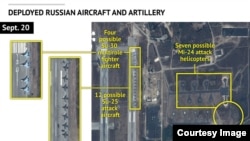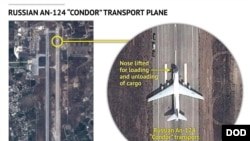On the eve of a visit Wednesday by Turkish President Recep Tayyip Erdoğan to Moscow, Turkey has dubbed Russia’s rapid military buildup in Syria as “very dangerous."
The condemnation came as U.S. officials said they were still trying to fathom Russian President Vladimir Putin's strategy in Syria - whether his military objective is to help battle against Islamic State extremists, as Moscow claims, or to strike at rebel fighters seeking to topple President Bashar al-Assad, a Russian ally.
Turkish Prime Minister Ahmet Davutoglu warned during a television interview Monday night that any military backing of the Assad government by Russia would hamper efforts to find a political solution to the four-year-long civil war raging in Turkey’s southern neighbor, and risked prolonging and complicating the brutal conflict, which has left a quarter-of-a-million dead.
Noting Russia’s longtime backing for President Assad, Davutoglu said Moscow’s support was now much more visible and menacing. “They have taken [it] into the field. This is very dangerous. Therefore, we watch with deep concern,” he said.
Ankara’s outspokenness on Russia's military build-up in Syria is a marked departure from its recent careful diplomatic rhetoric regarding Moscow. Erdogan has sought to improve his country’s awkward relations with Russia, and he and Putin have managed to compartmentalize differences over Syria and Ankara’s complaints about human rights violations against Crimean Tatars in Russian-occupied Crimea. Russian-Turkish relations have improved cautiously as trade between the two countries has expanded.
But a June meeting between the Turkish and Russian leaders in Baku, Azerbaijan, proved difficult, officials from both countries conceded at the time, and communiques released after their talks only mentioned gas and nuclear deals. Syria will be firmly on the agenda when the two leaders meet this time, according to Davutoglu, who in Monday’s television interview reiterated Ankara’s long-held position that Assad is to blame for the civil war and must relinquish power.
“İnsallah [God willing] Russia will not insist on ways and methods that will increase the tension,” the Turkish prime minister said.
U.S. officials told VOA Monday that Russia now has 28 advanced attack aircraft at an airbase near the Syrian coastal town of Latakia, up from four confirmed Russian warplanes on Friday. “It’s a significant, long-term build-up,” an official said. The combat planes include Su-24 attack aircraft, Su-25 ground attack aircraft and four Flanker fighter jets. Air power has consistently given Assad an edge in the war, and Syrian rebels have been urging the international community for months to impose a no-fly zone over northern Syria to stop the air blitz on insurgent-held territory.
This summer, rights group Amnesty International stated in a report: “Civilians in opposition-controlled areas of Aleppo have been bombarded in their homes, hospitals, schools, public markets and places of worship in air attacks launched by government forces.”
U.S. officials say Russia has started to fly drone surveillance missions in Syria. U.S. defense officials declined to comment on the new drone flights but told Reuters news agency they are “keenly aware” of Russia’s activities in Syria. Russia, they say, has 15 helicopters, nine tanks, three surface-to-air missile systems and at least 500 personnel on the ground in Syria. Other estimates of Russian ground forces in Syria are higher — more like 2,000.
Asked Monday during a news conference whether the U.S. government had figured out Russia's intentions in Syria, White House Press Secretary Josh Earnest responded: “To be blunt about it, no.”
Some U.S. analysts suspect Russia may be prepared to use special forces to assist Syrian government forces on the ground. And a video posted on YouTube last week appearing to show Russian tanks alongside Syrian forces in the Latakia region is being pointed to as evidence of that possibility.
But Mark Galeotti, a New York University professor and expert on Russian security affairs, doubts Russia will get involved in a ground war in Syria.
“Russia cannot escalate much in Syria: its forces are stretched with the Ukraine adventure, its supply lines are difficult, and in any case it is not willing to get sucked into a quagmire," Galeotti told VOA. "We are not really seeing a major commitment when it comes to ground forces. If they wanted to make a difference on the ground they would have to be sending in thousands of troops, and most of their good troops are either tied up in the Donbas region in Ukraine, rotating through the Donbas, or being kept in reserve in case they have to launch a surge in Ukraine.”
While Russia may use airstrikes to bolster the beleaguered Assad government, Galeotti sees the military buildup more as a political move ahead of the annual session of the United Nations General Assembly, which starts on September 25, and as a bid to “break the West’s resolve when it comes to insisting that Assad goes, and to break the diplomatic deadlock on Syria.”
By insisting that a "grand coalition“ including Russia is needed to fight the Islamic State group, Moscow is "upping the ante," Galeotti said.
"They are making the case that without Assad, you are basically handing Syria to the jihadists,” he said.
U.S. Defense Secretary Ashton Carter spoke with Russian Defense Minister Sergei Shoigu on Friday regarding Russia's military escalation in Syria. U.S. officials say they are concerned that midair mishaps between U.S.-led coalition warplanes and Russian jet fighters could occur in the limited airspace over northern Syria.
On Monday, Israel disclosed it was coordinating with Russia to prevent an unintentional conflict between Russian forces in Syria and the Israeli military. After meeting with President Putin in Moscow, Israeli Prime Minister Benjamin Netanyahu said they had “agreed on a mechanism to prevent such misunderstandings.”
Syrian rebel militias have said they will target Russian forces in Syria, promising to turn the country into a graveyard for them. "We will see any Russia soldier setting foot on Syrian soil as [an act of] occupation and aggression by Russia. We will fight them with all our might,” warned Colonel Mustafa Farhat, a spokesman for rebels aligned with the Western and Gulf-backed Free Syrian Army.
Over the weekend, the Islamist rebel militia Jaysh Al-Islam claimed it had damaged a Russian military transport plane with a Grad rocket on September 18. On Monday, the Russian Foreign Ministry reported that mortar shells were fired at the Russian Embassy in Damascus from a rebel-held suburb, but that no damage was caused.













